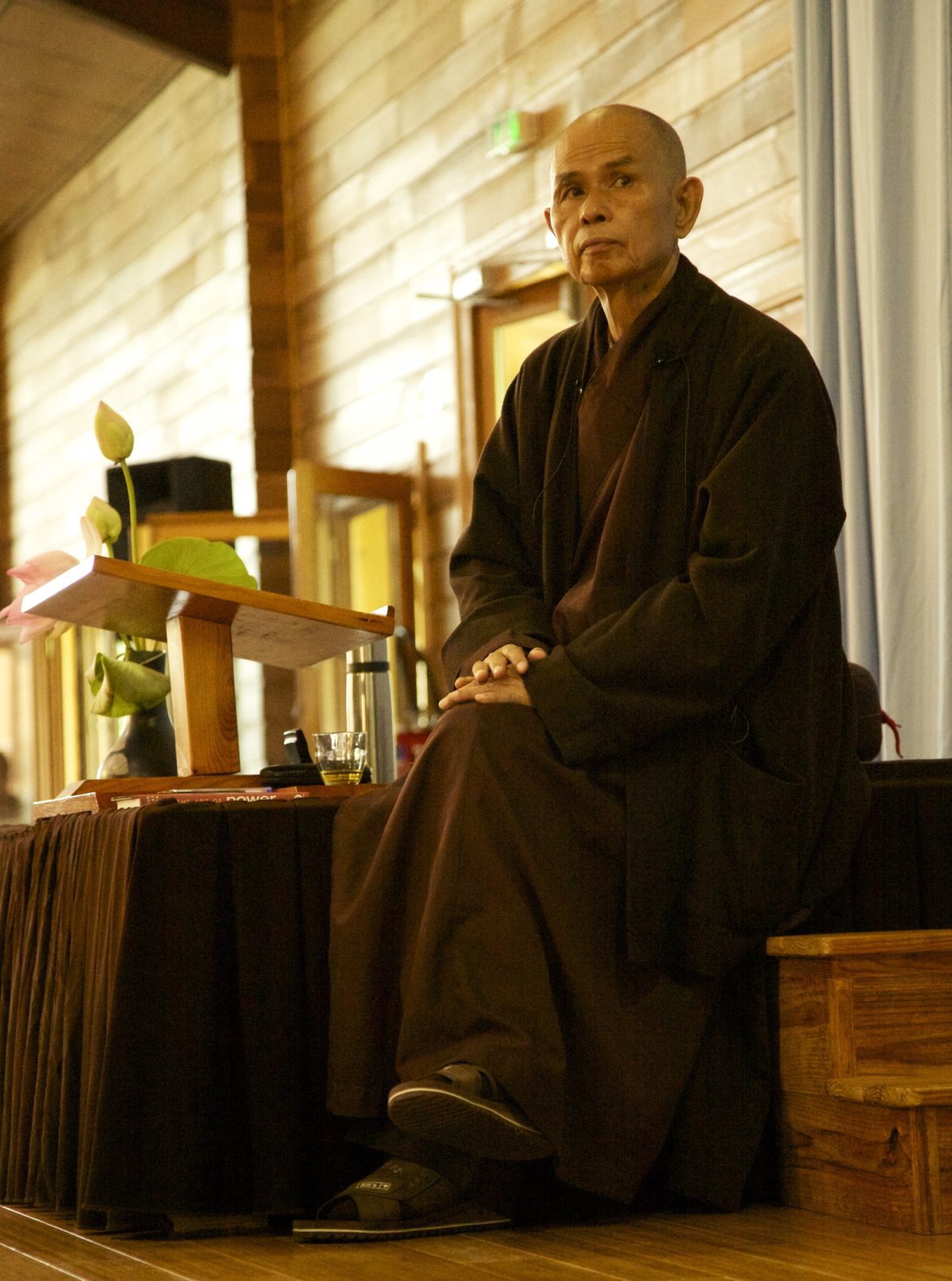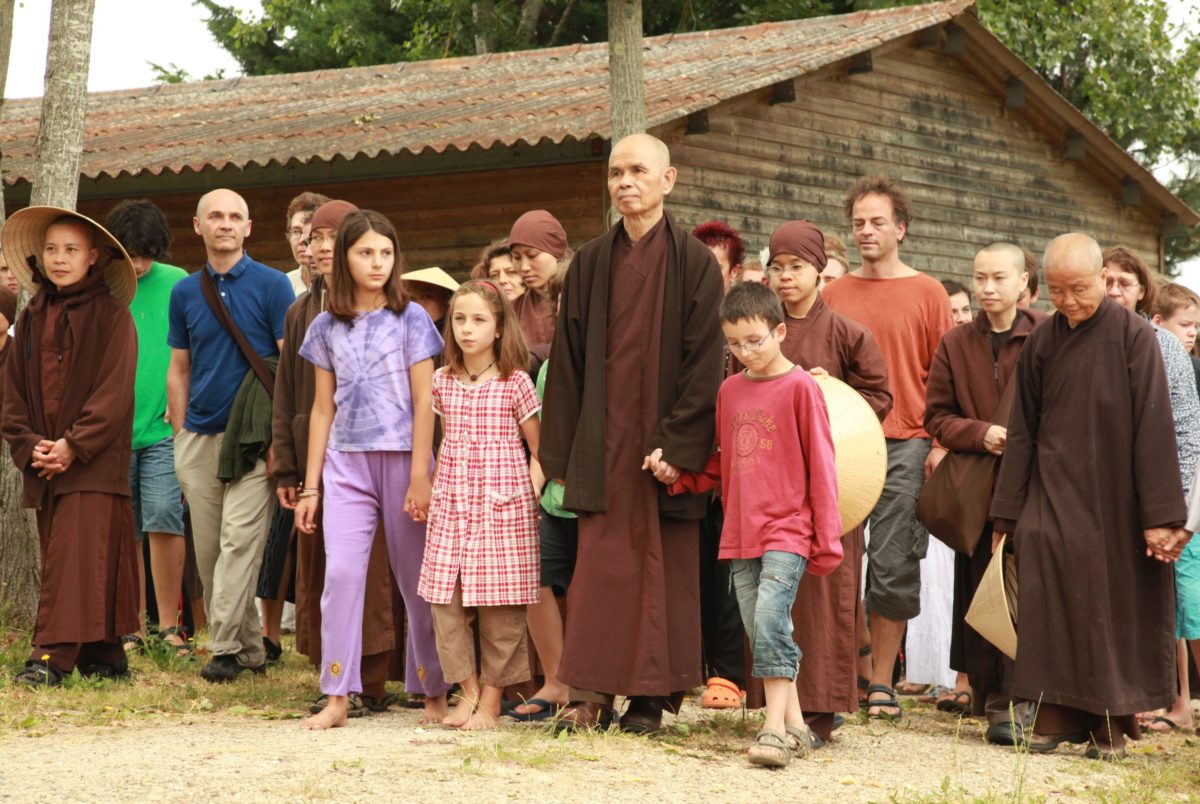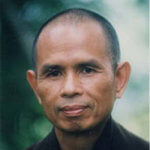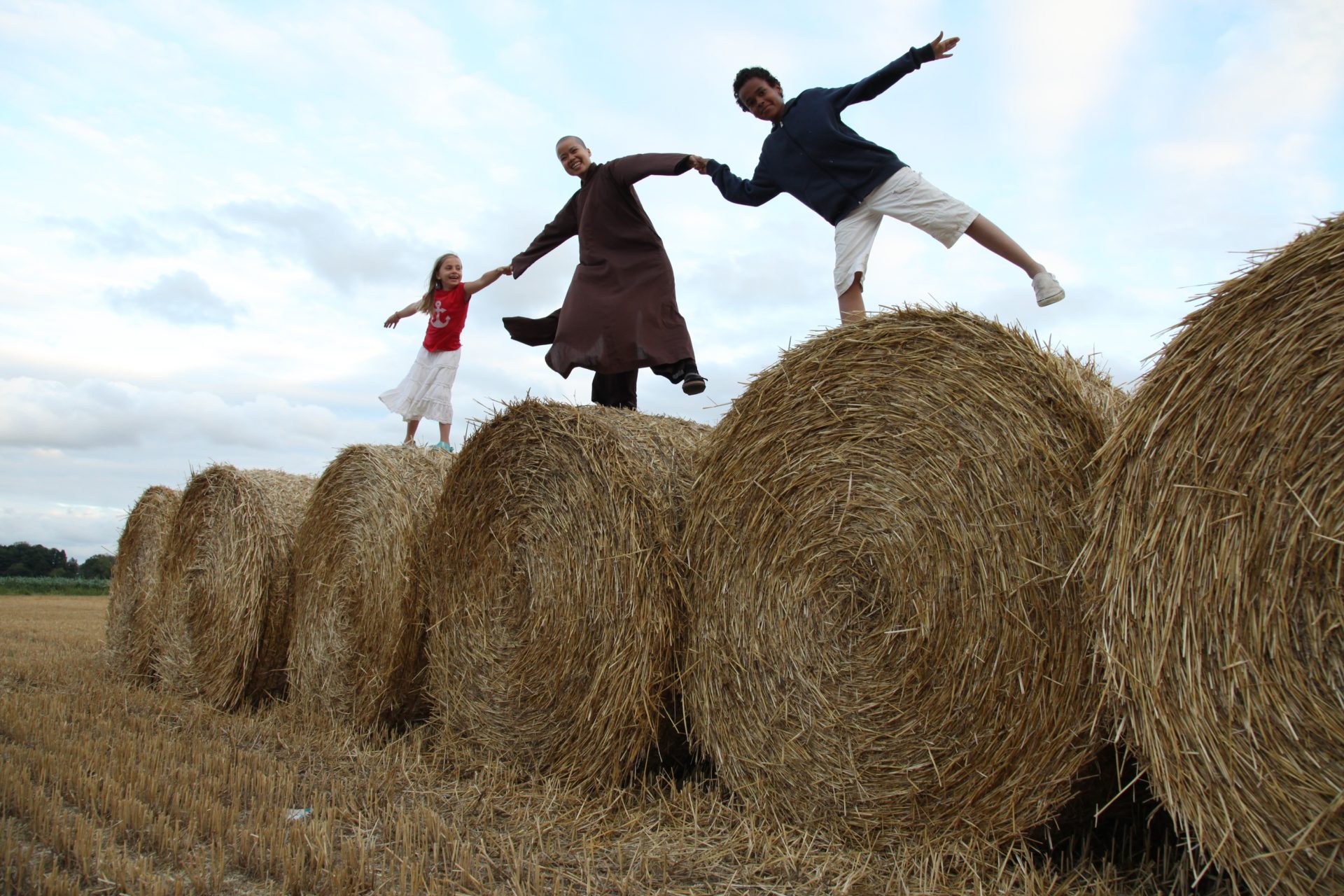By Thich Nhat Hanh in June 2012

New Hamlet, Plum Village
January 26, 2012
Dear Sangha, today is the 26th of January, 2012. We are in the Full Moon Meditation Hall of New Hamlet.
Today’s gatha from the sutra we are studying says that all of us contain a stream,
By Thich Nhat Hanh in June 2012

New Hamlet, Plum Village
January 26, 2012
Dear Sangha, today is the 26th of January, 2012. We are in the Full Moon Meditation Hall of New Hamlet.
Today’s gatha from the sutra we are studying says that all of us contain a stream, and we don’t have a separate self. The gatha is as follows: Living beings is the name of a continuous stream and all phenomena as the object of perception are only signs. Therefore there is no real change of birth into death and death into birth and no person who realizes nirvana.1
There are two things this gatha is teaching us. First, we don’t have a separate ego, a separate self, and second, everything comes from our perceptions, everything is an object of our perception. There is no one who attains nirvana, because if there is no separate self, then who will do that? At first we think we have to choose: either we are in the ocean of death and birth, and then we suffer, or we are in nirvana so that we don’t have to suffer. But after that we have to go further in our understanding. We have to see that birth and death is nirvana. If we are deeply in touch with birth and death, then we are in touch with nirvana. These two things are not separate; because of that, there is nobody in the stream of birth and death, and there’s nobody to go to nirvana. So we don’t have to do anything. We don’t even have to practice.
I wrote a poem about a stream, a little stream that begins at the top of a mountain. When the rain comes, it becomes a river. Many small streams come together to form the river, and the river flows down the mountain. We are describing a very young river. We are like this young river. When we are young, we are excited and we want to go very fast. Youth is always like that. We always want to attain something quickly. We all go through that stage; some have already gone through it, some are doing it right now. We want to attain something, we want to finish something, we want to go somewhere.
There are some young monks who very much want to become venerable elders quickly, so they act very serene, just like an old venerable one; they act older than their age. And there are some old monks who just want to wear the monastic robe of the novice monks so that they can look young.
So the young river was dancing and singing as he ran down the mountain quickly. He was very enthusiastic, and of course on the way he saw other streams and they all mingled together. We can see clearly that one stream, one river does not stay separate; it merges with many different streams as it travels. And our stream of life is the same: every day we have so many inputs, entering us all the time. If what enters into us is nourishing, that is good. But if what comes in is not fresh, it can make the stream of life not very good. Listening to the Dharma talk this morning is a nourishing input and helps us grow. The talk can contain insight and compassion. If we can absorb all of those little rivers within the Dharma talk, then our river later on will be very clear.
But also we have outputs. As the river flows down the mountain, it both takes in and gives out. For example, the river has to share some of the water with the grass. When the river arrives at the plains, there is no steep slope, so the river slows down. This happens to us as we grow older. We’re not excited; we have more peace. We have the ability to see what happens in the present moment because we have slowed down. When the river flows to the field it becomes a more peaceful river, and it has become larger, like the Fragrant River in Hue, the Red River in North Vietnam, the Mekong River, the Amazon River, the Mississippi, the Ganges.
The Cloud Is Impermanent
When the river slows down, it has time to reflect many colorful clouds. Clouds have many, many colors. Then the river starts to become attached to the clouds: “Oh, that cloud is so beautiful! Ah, that cloud is also beautiful!” And the river runs from one cloud to another cloud.
We, too, are a river; we’re a stream of water and we become attracted to that cloud, that image. We become attached to many exciting, colorful, and interesting things. But the nature of everything is impermanent, including the cloud. Now the cloud is here, but in the afternoon it will move on. As the clouds disappear, you run from one cloud to another cloud, trying to hold on. We, too, run after this or that project, after another beautiful woman, another handsome man. We feel some emptiness in our hearts and we are like a river running after a cloud. But the truth of the cloud is impermanence. Its nature is to disappear. We lose our breath running after this cloud, then another cloud, and then because we have that feeling of emptiness inside, we feel lonely.
Then one day the river is so sad, missing the clouds, and she has no desire to live. The sky is empty, there is no cloud to run after, nothing for us to run after. So the river wants to die. She wants to commit suicide, but the river cannot kill herself. It is impossible. A stream must continue; it cannot stop running.
And it is the same for us. We are a river of form, feelings, perceptions, mental formations, and consciousness. We say we can kill ourselves, we can commit suicide. But we can never do this because we will just appear in another form. So we have to run in a way that the stream becomes larger and larger, more and more limpid, more and more beautiful, and go in the direction which makes life more beautiful. The river was so empty and so lost, but she has to come back to the river, back to herself.

Already Enlightened
For the first time the river listens to herself. When she listens at the edge of the river, and hears a little lapping of the waves, that is like the sobbing of the river. But looking deeply, suddenly she will see that, oh, this little wave on the side of the river is also the cloud. And I, the big river, am already a cloud. I have all the clouds in myself. I have all my projects in myself, all the dreams in myself, all the aims in myself.
The nature of the river is a cloud; the nature of the cloud is a river. Because they are both made of water. You are already water. Why do you run after water? You are already what you are running after. That is the first insight of the river.
In Buddhism we have three doors of liberation.2 One of the doors is aimlessness. You don’t need to aim for anything. You don’t need to go anywhere. The third door of liberation is aimlessness. The second door is signlessness. The first one is emptiness.
Aimlessness means that you don’t need to aim for anything; you are what you are searching for. When the river realizes that she’s water, and that the cloud is in her because she is also water, she has no aim to run after, and she’s in peace. And it’s the same with us: we run after the Buddha, we run after satori, enlightenment. You don’t need to run after enlightenment; you are already enlightened. Where you are, steadily there, peaceful, clear in your mind, you are already what you are searching for.
When the river has found that deep vision, he runs peacefully and arrives at the ocean, which is also water. Wherever you are, you are already water. When conditions change and there is too much heat, you become water in the form of vapor, in the form of a cloud. Then as you flow peacefully as a river, there are plenty of clouds. But the river has no desire to run after the clouds because the river knows that all these clouds are himself. He doesn’t need to run after all these beauties, all these attachments. The river realizes that he is cloud.
And that night when the river realizes she is river, she is cloud, there is no discrimination between cloud and water vapor and water. That night there is a big enlightenment of cloud, moon, river, vapor, water, and they come together for walking meditation. They are together; they are one. They manifest in different forms, but they are one. They have already reached the door of liberation, aimlessness. They are not confused by the signs of their forms, and they experience non-self, interbeing. They are one.
Nirvana in You
We see the wonders of every second, of every minute. The sunshine is so beautiful. The Sangha is so beautiful. We are a river; we must run. Why do you think you can kill yourself? You cannot kill a river. The river continues to search for a way to continue. That is your practice. You only need to practice like that. You don’t need to learn thousands of sutras.You just walk on the Earth, really be with the Earth, be with the sun. The Earth is a wonder, the sun is a wonder. You are one.
The Earth is a great bodhisattva, the sun is a great bodhisattva. We cannot be different, we cannot find a better bodhisattva. You need only to practice like this; it’s enough. When you can walk mindfully, deeply, be one with the Earth, be one with the sunshine, be one with the universe, you can see that every step brings you to that great reality. So all your doubt will be removed.
In reality, there is nothing lost, nothing increased. Losing here, increasing there, you can see that nothing lasts. So our brother is lost, but he appears here, there, and in yourself, in many other people. Don’t try to find nirvana far away. You can find nirvana in you, in the present moment. Nothing is born, nothing dies.
Everything is no-birth, no-death, no increasing, no decreasing. We see the world of suffering and we see the world of enlightenment, because we are dualistic in our view. If you can touch the world of beauty in the world of ugliness, then you can touch the world of suffering in the world of enlightenment. The world of enlightenment is within the world of suffering. Don’t think that enlightenment is different from ignorance. From ignorance you can get enlightenment. You have to see that in suffering there are quite a lot of elements to help you reach enlightenment.
We have to learn to take care of our suffering in order to change, to transform, to be liberated. So when we have suffering, we have to suffer together. Don’t suffer alone. When you suffer alone you cannot find the way out. But if we suffer as a Sangha, together, we will find a way out. I’m very happy that I have you all together with me. I have gone through many difficult situations, but you are there, and we all work together for transforming our pain.
So like the river, don’t try to run after clouds. What you are running after is already here in you. The water is in you; the cloud is also water. It is not a promise of the future. Heaven is here and now. The Kingdom of God is now or never. You can stay where you are, not running after anything. You have to practice, “I have arrived, I am home.” That is our anchor. It means we dwell peace fully, happily, here and now.
I vow to bring my body, my mind, my action, and my speech to end all the war, the quarrels, and bring understanding and love to everyone. That is our duty. It’s our mission. Our mission is to bring understanding in life—to ourselves first—and then together, to one another. We try to bring understanding to close friends, to beloved ones both near and far away. We dwell peacefully, mindfully, in the present moment, in order to protect our beautiful green planet, and we vow to see the interbeing of everything in order to transcend the signs, the appearance. In this way we touch reality.
You have to be aware that every word influences the whole Sangha. Every bodily action influences the whole Sangha. When you think something, it influences the whole Sangha. You are a cell of a body. You have to think in a way that brings happiness and purity to the Sangha. You have to speak in a way that brings purity and understanding to the Sangha. We have to act in a way that brings understanding and beauty to the Sangha in order to create the Pure Land. To truly arrive, not to be carried away by appearances, to transcend the signs. You love me—it means you love you. You love you—it means you love me.
Applied Buddhism is the way to touch reality, in order to see that birth and death are only doors by which you enter and leave. It looks like you are born, it looks like you die, but really you are born every second, you are dying every second.
So, friends, don’t think that this body is just you, because you are a river. This river continues to flow and to flow. And if it stops here, it will appear on the other side.
TRANSLATED FROM VIETNAMESE BY SISTER CHAN KHONG; EDITED BY SISTER ANNABEL AND BARBARA CASEY.
1. Gatha 44 from the Yogacarabhumishastra by Acarya Asanga
2. The Three Doors of Liberation:
Emptiness: Interbeing; the realization that we are empty of a separate, independent self. When we practice eating meditation, seeing the cosmos in our food, this is the practice of emptiness.
Signlessness: Not getting caught in the appearance or the object of our perception; not being limited by the form: i.e., seeing that the cloud and the river are the same in essence, both made of water.
Aimlessness: The realization that we already have Buddha nature, that all the elements for happiness are already within us. The practice of aimlessness is the practice of freedom.


